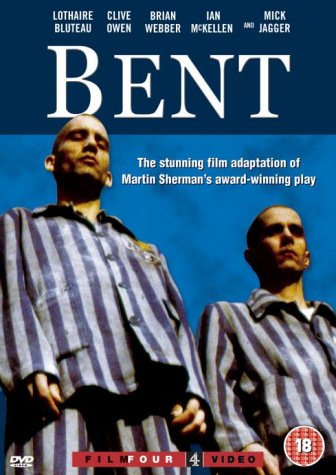
BENT
UK, 1997, 107 minutes, Colour.
Clive Owen, Lothaire Bluteau, Ian Mc Kellen, Nikolaj Coster- Waldau, Mick Jagger, Brian Webber.
Directed by Sean Mathias.
Bent is based on the play by Martin Sherman (screenplays for Mrs Henderson Presents, Callas Forever). The play made quite an impact, controversially, on the Broadway and London stages with Richard Gere and Ian Mc Kellen respectively. Sherman has opened out his play, though much of the dialogue is obviously from the theatre and portrayed theatrically while outside, especially in a stone quarry. Sean Mathias directed the play and makes his film debut with Bent.
Clive Owen, before he became more famous and more serious with such films as Croupier, portrays the central character Max. Max has moved away from home, moves in the homosexual circles and clubs in pre-World War Two Berlin. With Hitler’s ordering of the death of Ernst Rohm and his SA, because they were homosexual, there is a rounding up of homosexuals in Berlin and their being transferred to Dachau. After being on the run with his dancer companion, Brian Webber, Max is interned in Dachau. In the train he meets Horst who wears a pink triangle and explains this to Max who opts for a yellow star even though he is not Jewish.
The rest of the film highlights the relationship between Max and Horst, a verbal communication, an indication of the intensity of same-sex love without any physical contact. Ultimately, Horst is executed by the prison guards and Max takes on his pink triangle.
Ian McKellen?, who appeared originally of the West End, has a cameo role as Uncle Freddie. Very striking is the performance and singing of Mick Jagger as a drag queen in the Berlin club. In the supporting cast, difficult even to glimpse are Jude Law, Rupert Graves, Rupert Penry- Jones and Paul Bettany.
The film opens with some more explicit presentation of the decadence of life in the Berlin clubs but soon moves to a more intellectual and emotional understanding of homosexuality.
1. The film based on a play? The controversies at the end of the 1970s? The film in the 1990s? Society and its understanding of homosexuality?
2. The perspective of the writer, the director? The presentation of the central character sympathetically, the background of their lives, their sexual orientation, their searching, loneliness, love? How sympathetic and understanding?
3. The early sequences in Berlin, the presentation of the club, the decadence (echoing such films and plays as Cabaret)? The clientele? Hitler’s attitude, the SA, the murder of Ernst Rohm and his men? The beginning of persecution? The transition to Max’s apartment? His relationship with Wolf, the jealousy of Rudy, their fleeing in the streets? The countryside and their hiding? The train trip to Dachau? The visuals of Dachau, the buildings, the open fields, the stone quarry? Philip Glass’s musical score, piano, classic style?
4. The focus on Max, his being at home in the decadence of the clubs? Flirtatious, promiscuous? His charm? His relationship with Rudy, Rudy and his dancing, Rudy’s jealousy? Taking Wolf home? The arrival of the storm troopers? The attitude of the SS, Rudy and Max being able to escape, the arrest of Wolf, his throat being slit?
5. Greta, the drag queen, the songs, the lyrics? Mick Jagger in this role? His being interrogated, giving information? His meeting Max and Rudy, his becoming George? Going into the church? Promising not to inform on them until after the service?
6. Max and his meeting his Uncle Freddie? Uncle Freddie’s explanation of the family, their wanting Max back, Freddie’s own quiet homosexuality, coping, covered? His advice to Max, providing a ticket? Max and Rudy, the bond between them, Max and his protectiveness of Rudy, Rudy and his lack of common sense, impulsiveness? Their having to run and be pursued? Their being caught?
7. The cattle truck to Dachau, dank, dark? Rudy and the officer making him break his glasses? His being beaten, Max saying he did not know him? Rudy being thrown out of the train? Horst, his advice to Max to be unobtrusive?
8. The arrival in Dachau, the concentration camp, the prisoners? The Jews and the yellow star? Max and his money, buying a yellow star? Horst, his background, his defence of homosexuals, the pink triangle? The initial hostility between the two?
9. The details of life in the camp, the dormitories, work? Max and Horst and their having to move the rocks from one pile to the other? The main action taking place in this quarry?
10. Max and his development of character, his learning some humility, his beginning to understand Horst? His not wanting to acknowledge his homosexuality? Their discussions? The importance of their use of the imagination, the two of them using verbal descriptions of intimate contact, their standing apart? The emotional impact, empathy, understanding each other? Max and an awakening of love instead of self-centredness? Horst as generous? His illness, Max going to the officer, the sexual favour, the medicine?
11. The officers coming to the quarry, interrogating Horst about his health? The attack on Horst, putting him at the fence, tossing his hat on the fence, Horst and his knowing he was to die, running towards them and being shot? Max’s compassion, holding Horst, taking him for burial? His talking to Horst, an acknowledgment of his feelings? His taking his coat? Wearing the pink triangle?
12. How well did the film work as drama? Theatrical and verbal? The emotional response? Insight into character and themes?